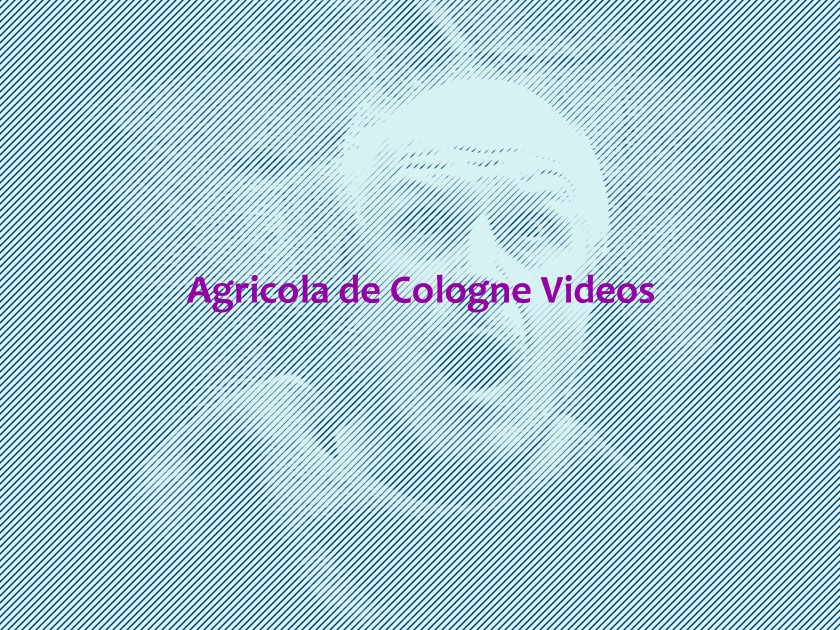
The Plea – A Palestinian Trilogy
2017, 40:00
In October 2017, Agricola de Cologne completed his film project “The Plea – A Palestinian Trilogy” starting in 2005 when he visited the Westbank for the first time.
The project is consisting of three videos created between 2005 and 2016, a period when the political situation in Middle East escalated dramatically.
The footage of the first part, entitled “Message from Behind the Wall” released in 2005, is reflecting the erection of the big wall in Bethlehem in 2005.
The 2nd part, entitled: „One Day On Mars“, completed in 2008, is based on footage Agricola de Cologne shot 2006 when he was visiting Palestine for the 2nd time, while the footage of the 3rd part, entitled “Shatila – Lost Island” completed in 2016, was shot 2012, when he was visiting Beirut and the Palestinian refugee camp „Shatila“. The camp which is currently also shelter for Syrian refugees in Beirut is now a symbol for two most dramatic conflicts in Middle East and failed international politics at the expense of the Palestinian people.
Visiting Middle East and dealing with the Palestinian question is causing a differenciated point of view and thinking. While the problem is dominated by two (however, failed) political ideologies drawing reality black and white, the “true” reality shows multi-facetted shades of grey, in which the “normal” people are yearning desperately for living in peace, dignity and the perspectives for a future.
The film project “The Plea” is a plea for humanity on one hand and a self-determined life which is representing a human right.
The Plea – A Palestinian Trilogy
1.
Message from Behind the WAll
http://agricola-de.cologne/video/?p=459
2005, 10:00
The segregation wall in Palestine is a fact. In November 2004, an artistic action against the wall ended, taking place at six different places in Palestine where walls were under construction, initiated by Palestine artists by inviting artists from different countries to paint an artistic message on the concrete.
When Agricola de Cologne was in Bethlehem in February 2005, he visited several places where the Israeli were erecting the wall. The part of the wall he was filming, is situated in opposite of the AIDA refugee camp (UN), and was at that time a temporary playground for children. And these children made their own contribution to the huge wall paintings.
“Message from behind a Wall”is transporting different messages, but the main message represents the action of children’s innocence.
The moving picture is a unique document of the day of 17 February 2005. In 2006. however, the construction of the wall in Bethlehem was completed, and the hostile area around the wall is not used any longer as a playground for children.
2.
One Day on Mars
http://agricola-de.cologne/video/?p=478
2007, 8:00
A human being is obliged to spend at least one day in his lifetime on Mars. Mars the red desert planet, Mars the god of war. Mars can be anywhere, any place which is identified with the inhuman, violence, hate, rage, revenge and despair.
Agricola de Cologne filmed the original material 2006 during a visit in Palestine & Israel.
3.
Shatila Lost Island
http://agricola-de.cologne/video/?p=667
2016, 20:00
“It was a wonderful sunny afternoon, time for dreaming when my Palestinian guide catched me from the hotel in downtown Beirut. We were riding with his car about a quater of an hour but after a while the car was swimming in a kind of mysterious fog like a boat in the sea when suddenly the gate of an Arab town appeared from nowhere. Entering this gate I was entering a forgotten, enchanted world, happy and very sad alike crowded with people who seems to live in an ancient and contemporary world at the same time. They call it camp, but aren’t we all living in camps.”
Shatila –
that’s the name of this place. Seperated from the metropolitan area of Beirut, but at the same time in its center, but invisible to those who do not know, and for those who know a kind of “tabu” is speading the message of not existing.
Errected as a Palestinian refugee camp in Beirut in 1949, its actual purpose was to give Palestinian refugees – expelled from their home land Palestine a temporary shelter – lasting probably in the beginning just for a few months, to be later prolonged for some years, but since many years, however, for permanent. After nearly 70 years, still provisional and only for humanitarian reason tolerated by the Lebanese, the camp developped to a real Arab town – but an island of no return within the community of Beirut – where generations of Palestinians – followers of the first refugees – eke out their existance as “unwanted” – as eternal refugees – without any perspectives for a future.
People forgot its existance so that Shatila and its inhabitans became during the past decades invisble, until 2012 people remembered Shatila – this fogotten island – as an ideal shelter for refugees escaping from the Syrian civil war (which is since then escalating in a most horrible way).
While until his dead the Palestinian leader Yasser Arafat represented the only hope for these Palestinian refugees living in camps in and outside Palestine, after his death 2004, however, it was Bashar al Assad, the current Syrian dictator who took over this role but waging since many years a war against his own people with terror and death, causing since 2012 hundreds of thousands of Syrians to escape to Lebanon. Once the only hope for the Palestinians, Assad, is standing now for the abolute despair and hopelessness. How quickly Shatila turned again to that forgotten area and invisble area – an island – located in the middle of metropolitan Beirut.
The video is representing the final part of Agricola de Cologne*’s “Palestinian Trilogy”, which is including also the previously released videos “Mesaage from behind a Wall” (2005) and “One Day on Mars” (2008) based on original footage shot in Palestine (Westbank) and Israel.
